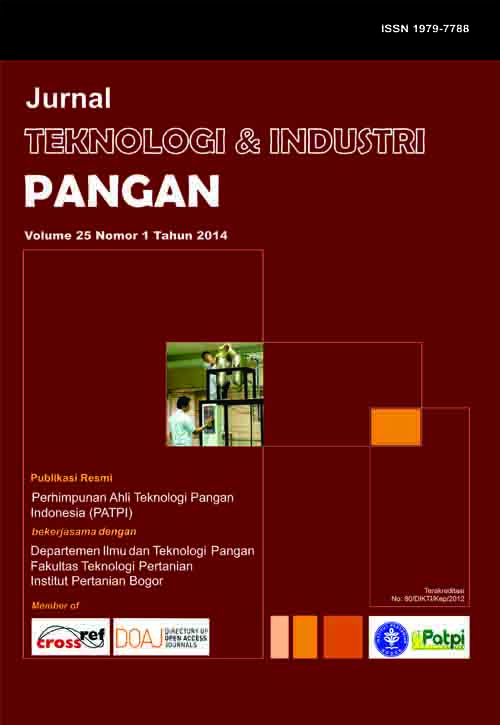RAPID DETECTION OF Salmonella IN SHRIMP BY POLYMERASE CHAIN REACTION [Deteksi Cepat Salmonella pada Udang dengan Polymerase Chain Reaction]
Abstract
RAPID DETECTION OF Salmonella IN SHRIMP BY POLYMERASE CHAIN REACTION
[Deteksi Cepat Salmonella pada Udang dengan Polymerase Chain Reaction]
Ulfah Amalia1,2), Ratih Dewanti-Hariyadi2,3)* and Achmad Poernomo4)
1) Faculty of Fisheries and Marine Science, Diponegoro University, Semarang
2) Department of Food Science and Technology, Bogor Agricultural University, Bogor
3) Southeast Asian Food and Agricultural Science and Technology (SEAFAST) Center, Bogor Agricultural University, Bogor
4) Center for Research and Development and Product Processing and Marine Biotechnology Fisheries (CRDPPMBF), the Ministry of Marine Affairs and Fisheries, Jakarta
Accepted September 27th 2013 / Approved July 4th 2014
ABSTRACT
Shrimp is an important non-oil commodity for foreign trade in Indonesia. However, rejection of shrimp exports by the importing countries is still commonly encountered. In 2011, the USFDA recorded two cases of Salmonella spp. contamination in shrimp products from two shrimp processing companies in Indonesia. Analysis of Salmonella spp. in seafood is generally performed using a conventional method which takes at least 5 days. The objective of the study is to get a Salmonellae rapid detection method in shrimp by PCR. In this study, optimization of PCR protocol method to detect Salmonella invA gene was conducted using six different annealing temperatures (59, 59.5, 60.8, 62, 64 and 64.5°C). The results showed that 64°C was the optimum annealing temperature to detect the 284 bp fragment of Salmonella invA gene. The PCR based detection method has a DNA detection limit of 27.81mg/mL and 10°CFU/mL of viable salmonellae with 100% specificity. The PCR protocol is capable of detecting six different Salmonella serovars (S. Enteritidis, S. Hadar, S. Heidelberg, S. Kentucky, S. Paratyphi and S. Typhimurium) but none of the non salmonellae isolates. Application of the PCR assay on Salmonella in shrimp after the selective enrichment step suggested that all 16 samples were positive for Salmonella. At the same time, the conventional method could only detected 3 samples for Salmonella positive.

